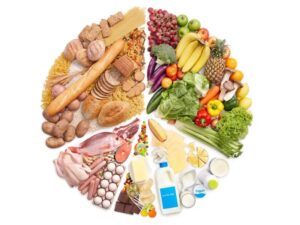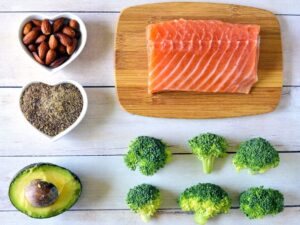
A healthy diet is essential for good health and wellbeing. A balanced diet provides our bodies with the essential nutrients required for optimal functioning, growth, and repair. Macronutrients and micronutrients are two key types of nutrients that our bodies need in order to function properly.

Macronutrients are nutrients that our bodies require in large amounts. These include carbohydrates, proteins, and fats. They are the primary sources of energy that our bodies use to perform essential functions such as breathing, moving, and thinking. Carbohydrates are the main source of energy for the body, and they are found in foods such as bread, pasta, rice, and fruits. Proteins are essential for building and repairing tissues, and they are found in foods such as meats, nuts, and beans. Fats are important for energy storage, insulation of organs, and hormone production, and they are found in foods such as nuts, seeds, oils, and fatty fish.
Micronutrients, on the other hand, are nutrients that our bodies require in smaller amounts. These include vitamins and minerals. Micronutrients play essential roles in various bodily functions such as maintaining a healthy immune system, nerve function, and bone health. Vitamins are organic substances that are essential for good health, and they can be found in foods such as fruits, vegetables, and dairy products. Minerals are inorganic substances that are essential for good health, and they can be found in foods such as leafy greens, nuts, and whole grains.

A healthy diet should contain a balance of both macronutrients and micronutrients. Consuming too much of one macronutrient or micronutrient can lead to health problems. For example, a diet that is high in carbohydrates can lead to weight gain and insulin resistance, while a diet that is high in saturated fats can lead to high cholesterol and heart disease. Similarly, consuming too little of a micronutrient can lead to deficiencies and health problems. For example, a lack of vitamin D can lead to bone abnormalities, while a deficiency in iron can lead to anemia.
To ensure that you are getting the right balance of macronutrients and micronutrients, it is important to eat a variety of whole foods. Whole foods are foods that are minimally processed, and they include fruits, vegetables, whole grains, lean protein sources, and healthy fats. These foods provide a wide range of nutrients and are often more nutrient-dense than processed foods.
Macronutrients and micronutrients play crucial roles in maintaining a healthy diet. A balanced diet that includes a variety of whole foods is essential for good health and wellbeing. By paying attention to the types of foods that you eat and ensuring that you are getting a balance of macronutrients and micronutrients, you can take steps towards a healthier and happier life.








